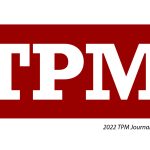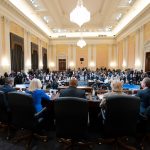
Josh Marshall
 Please Read This Very Important Message
Please Read This Very Important Message
This week we are kicking off our annual drive for The TPM Journalism Fund. This year the drive is particularly important because this has been an especially difficult year for news publishing generally and us in particular. If you are a member you are already supporting our work. But if TPM is important to you, today I am inviting you to contribute to the Fund if you are able. If that’s all you need to hear, please just click right here.
The TPM Journalism Fund is designed to accomplish two things. Produce more journalism and make our journalism more accessible. The Fund does that in two ways. First, it supports the work of the whole TPM Team. Second, for every $60 contributed to the Fund, we will create a membership for a student or someone experiencing financial hardship.
We hear from core readers a lot asking, “What more can I do, what more do you guys need?” That’s why we created the Fund. In 2020 it allowed us to add a new member to the team even during the incredibly brutal economics of the first year of the pandemic. This year our focus is not so much on growing — though it would be wonderful to do that — but rather on sustaining our efforts. So this drive is really very important for TPM.
Having sounded a bit of an alarm about the importance of this year’s drive, I owe you some explanation.
Over the years I’ve told you about the general discontents and woes of the news publishing business, especially starting in the middle of the last decade. Those remain the case. In some ways they have intensified. But the last year has brought a different kind of challenge. These times are, as you may feel yourself, the winter of our discontents. People see our politics in a dismal state. They have a general foreboding about what comes next.
Our existing members — you — have continued to remain steadfast and renew at exceptional rates. But a publication needs to be signing up new readers at a certain pace just to keep up with what publishers call “churn” — the inevitable coming and going of subscribers that is the case for any publication. This climate has made getting new sign ups particularly difficult. For the present, that has made us even more reliant on the TPM Journalism Fund.
We have also been brainstorming internally about new ways to tailor our offerings to this particular moment — something a vital publication always needs to do. And we have some new offerings coming on that front — ones which I think you will also enjoy. But for now, we are very reliant on meeting our goal for this drive which is to raise $200,000 for the Fund, a bit under 7% of our annual budget.
And with that, we are under way on this year’s drive. If you’re able to contribute, please just click right here. Thank you again for being a reader, a member and a contributor. We truly appreciate your support.
It occurs to me that some may read the post below about the U.S. and Saudi Arabia as an indictment, that the policy decision is a mistake. That’s not my thinking at all. I think that given our options and our needs it is definitely the right decision. I do think the Ukraine War was the breaking point. Once Russia invaded Ukraine the need to deal with global energy markets became critical and Ukraine was our core strategic interest. Regardless, it’s the right decision. Mostly because it’s the only decision.
A big thank you to everyone who’s contributed so far in Day One of this year’s TPM Journalism Fund drive. If you can contribute we would greatly appreciate it. Below I explain just what the Fund is and why it’s so critical this year especially. If you’re able, just click right here. Thank you.
 MBS Broke Us
MBS Broke Us 
Sometimes the biggest things happening in the world are happening out of view. Sometimes they’re hidden but just as often they simply don’t get the attention they should because they don’t have traction as news stories. Or perhaps all the players have their own interests in not drawing attention to them. You may have noticed that Joe Biden is traveling to Saudi Arabia next month and that he plans to hold a summit with the de facto ruler of the country, Mohammed bin Salman — usually called MBS. He’s going to Riyadh. MBS is not coming to Washington. This is presented as a full reset of relations between the two countries and — though this is stated less directly — a full reset with MBS. So all that human-rights, Yemen-war, Jamal-Khashoggi-being-dismembered-at-a-consulate-in-Istanbul stuff is done with. That was then. This is now.
Read More Awkward
Awkward 
There was quite a bit of subtle storytelling and repositioning going on through this morning’s testimony. Perhaps especially from Bill Barr. But there was one moment from Barr that struck me as revealing. During his testimony, Barr was describing the run-up to one visit to the White House when it was clear that Trump wasn’t going to acknowledge he had lost. Barr said that it was getting a bit “awkward.” That’s probably an understatement.
Read More What Does Trump Believe?
What Does Trump Believe? 
I was about to respond to this email from TPM Reader JR. But I decided it made more sense to respond here.
Lots being written about the importance of establishing whether Trump “knew” he lost. Greg Sargeant this morning, Slate over the weekend (does Trump really ever “know” anything”) etc etc. I don’t touch criminal law but it seems to me that focus is too narrow. I would think Trump could have had the requisite criminal intent to use illegal means to overturn an election even if he “believed” the election was being stolen from him. That is, if he knew or was wilfully blind to the fact that he or his team were using unlawful means to “contest” the election, wouldn;t that be enough? If he had warnings his words and actions would incite the violence1/6 or were in coordination with plans for the assault on the Capitol, why does it matter whether he “knew” he lost or not?
Like JR, I’m not a lawyer. So I can’t speak to the internal logic of particular case law or legal standards about mens rea and consciousness of guilt. But I think the way to approach this question is to work it from the other side, as it were.
Read More Something Doesn’t Fit
Something Doesn’t Fit 
Here’s an interesting nugget that puts an added context to Bill Stepien’s appearance before the Jan 6th committee. Stepien is working as an advisor/consultant to the campaign of Wyoming Republican Harriet Hageman, the woman running against Liz Cheney in the House primary in Wyoming. (Wyoming has a single representative in the House.)
Normally this wouldn’t be surprising. A top Republican operative might be working with any number of Republican candidates. But Hageman isn’t any Republican. Her candidacy is inextricably tied to the Big Lie. In fact, it’s run almost entirely as a Trump campaign proxy. And of course, Cheney is literally front and center in the committee’s work.
Read MoreLater this week we’ll be kicking off our annual TPM Journalism Fund drive. This year it is particularly important. Please keep an eye out for the announcement.

You see in the feature story that Bill Stepien, Trump’s 2020 campaign manager after Brad Parscale got canned, is going to be a star witness at the second Jan. 6th committee hearing tomorrow night. I wanted to remind you that Stepien was once a top operative and advisor to Chris Christie. But he fell from grace as part of the Bridgegate scandal back in 2013. When the scandal hit, Christie made Stepien one of the scapegoats. He cut him loose like a dog, as Trump might say. (Stepien himself was never charged with a crime though two of his colleagues were charged and were later convicted, before having their convictions tossed by the Supreme Court.)
Read More Connecting the Dots
Connecting the Dots 
There are many things that came out of the first Jan 6th hearing. We’ll talk more about them going forward and we’ll see these points unfolded, I assume, in subsequent hearings. But one point already came through pretty clearly and well and that is the integral role of the two fascist paramilitaries, the Proud Boys and the Oath Keepers.
Read More